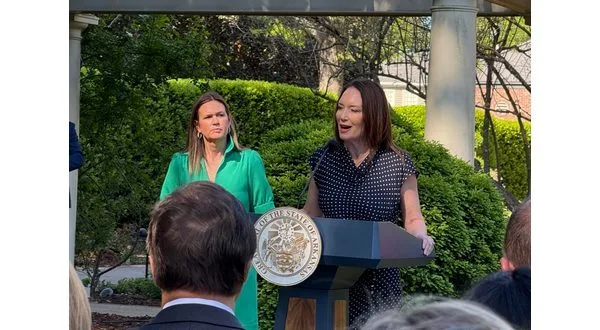
Gov. Sarah Huckabee Sanders (left) and USDA Sec. Brooke Rollins in April. (Ainsley Platt/Arkansas Advocate)
The Arkansas Department of Human Services is providing the U.S. Department of Agriculture with data on the number of certain SNAP program applicants, following a sweeping demand from the government earlier this month. A DHS spokesperson did not confirm or say whether the agency would share more sensitive data in the future.
The data-sharing was initially confirmed in emails provided to the Advocate through an Arkansas Freedom of Information Act request, and then by a DHS spokesperson, who said none of the information shared thus far was personally identifiable.
A USDA official sent a letter to states on May 6, stating they would need to provide USDA with a trove of personally-identifiable information on Supplemental Nutrition Assistance Program recipients, such as names, addresses and Social Security numbers data not typically shared with USDA as part of the SNAP program.
USDA directed states to provide “[r]ecords sufficient to identify individuals as applicants for, or recipients of, SNAP benefits, including but not limited to personally identifiable information in the form of names, dates of birth, personal addresses used, and Social Security numbers,” along with detailed payment data to show how much a recipient has received in benefits. The request is for data dating back to Jan. 1, 2020.
Failure to provide the data or give permission for third-party data processors to do so could trigger “noncompliance procedures,” the letter continued.
In an email to two members of Gov. Sarah Huckabee Sanders’ communications team, DHS spokesperson Gavin Lesnick wrote on May 9: “One more for you a reporter with the Washington Post reached out below about a new requirement for all states to share SNAP data with USDA. We are in the process of providing this data.”
However, in response to questions from the Advocate, Lesnick said the data provided by the department was not personally identifiable.
“The Arkansas Department of Human Services (DHS) began sharing data last week detailing the number of disqualified and sanctioned SNAP applicants so far this year,” Lesnick wrote in an emailed statement. “This dataset did not include any personal information.”
SNAP data is “stored by DHS” but is also provided to a third-party vendor to produce the program’s EBT cards, Lesnick said.
When asked to clarify whether DHS had plans to share the broader trove of personally identifiable information requested by USDA in the future, Lesnick did not directly answer the question.
“DHS plans to provide USDA any data requested that supports efforts to ensure program integrity,” he said. “We take seriously our responsibility to safeguard sensitive data, and will ensure any information submitted to USDA is provided safely and securely. Questions about specific data types or future requests should be directed to USDA.”
The statement Lesnick provided to the Washington Post reporter earlier this month said: “The Arkansas Department of Human Services is fully committed to efforts to detect and prevent fraud, waste, and abuse in all programs, including the Supplemental Nutrition Assistance Program (SNAP). We look forward to continuing our partnership with the U.S. Department of Agriculture’s Food and Nutrition Service to ensure that SNAP benefits go only to eligible families.”
The May 6 letter was prompted by a March executive order from President Donald Trump called “Stopping Waste, Fraud, and Abuse by Eliminating Information Silos,” which directed officials to take all steps necessary “to the maximum extent consistent with law,” to obtain access to data necessary to root out “waste, fraud, and abuse.”
It also directed federal agencies to take steps to gain “unfettered access to comprehensive data from all State programs that receive Federal funding, including, as appropriate, data generated by those programs but maintained in third-party databases.”
The USDA letter said that “At present, each State, district, territory, and payment processor is a SNAP information silo.”
USDA requires “unfettered access” to the data held by states and third-party processors, the letter said, to eliminate inefficiencies and fraud in accordance with Trump’s executive order.
However, privacy advocates have raised alarms over the demand, sending letters to third-party data processors used by states urging them not to comply.
States Newsroom has reported on efforts by the so-called Department of Government Efficiency to consolidate personally identifiable information from various government databases, potentially in violation of privacy laws.
Some states, such as New Mexico, have refused USDA’s demand on privacy grounds. Others, like Iowa and Alaska, have complied.
As of March, 235,927 people in Arkansas received SNAP benefits, the Advocate previously reported approximately 7.6% of the state population. As reported by NPR, the personal data of SNAP recipients normally remains under the control of states, while USDA is able to audit state programs.
To view this story, or for more news updates from Arkansas Advocate, click here.
WebReadyTM Powered by WireReady® NSI










